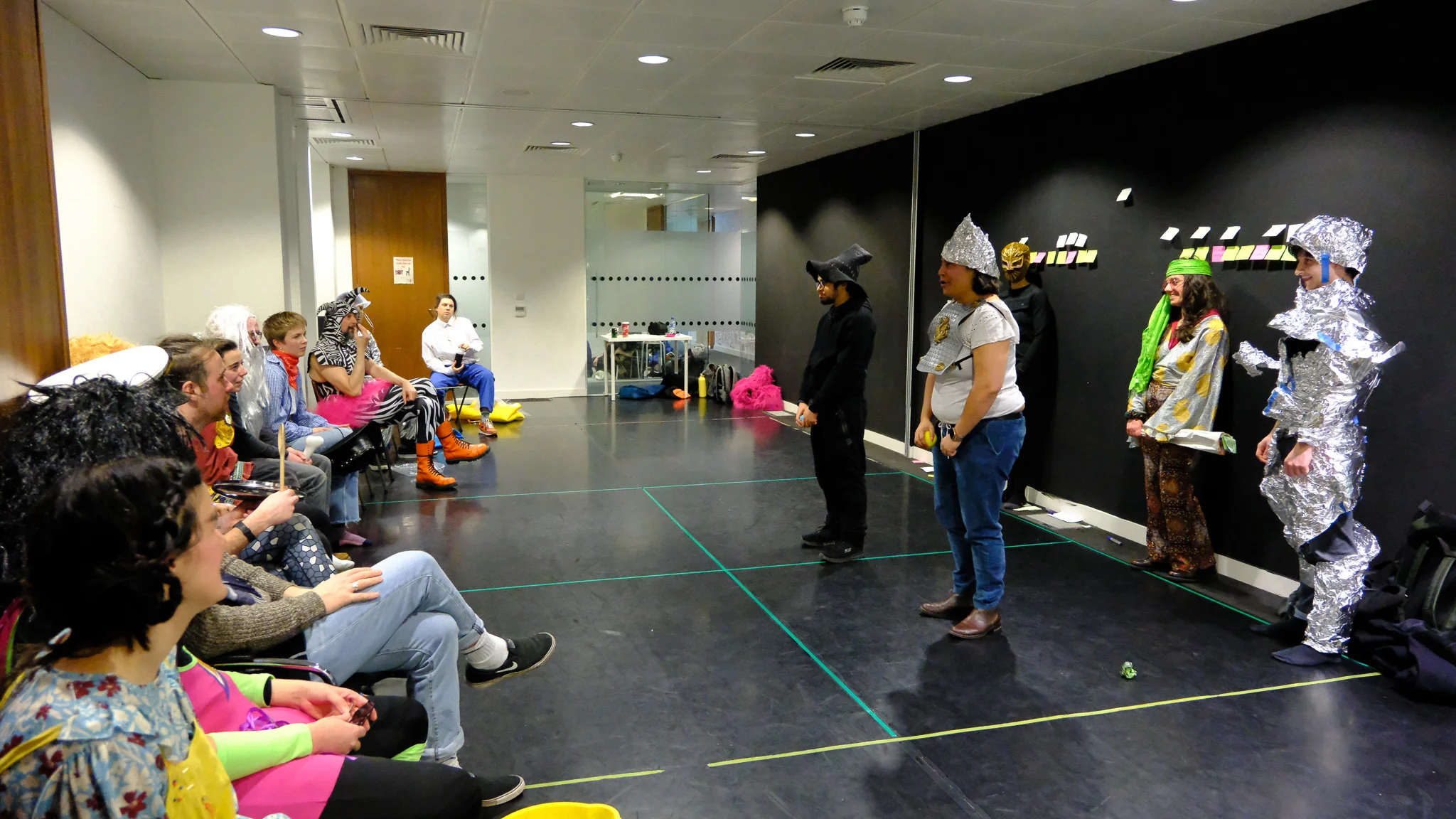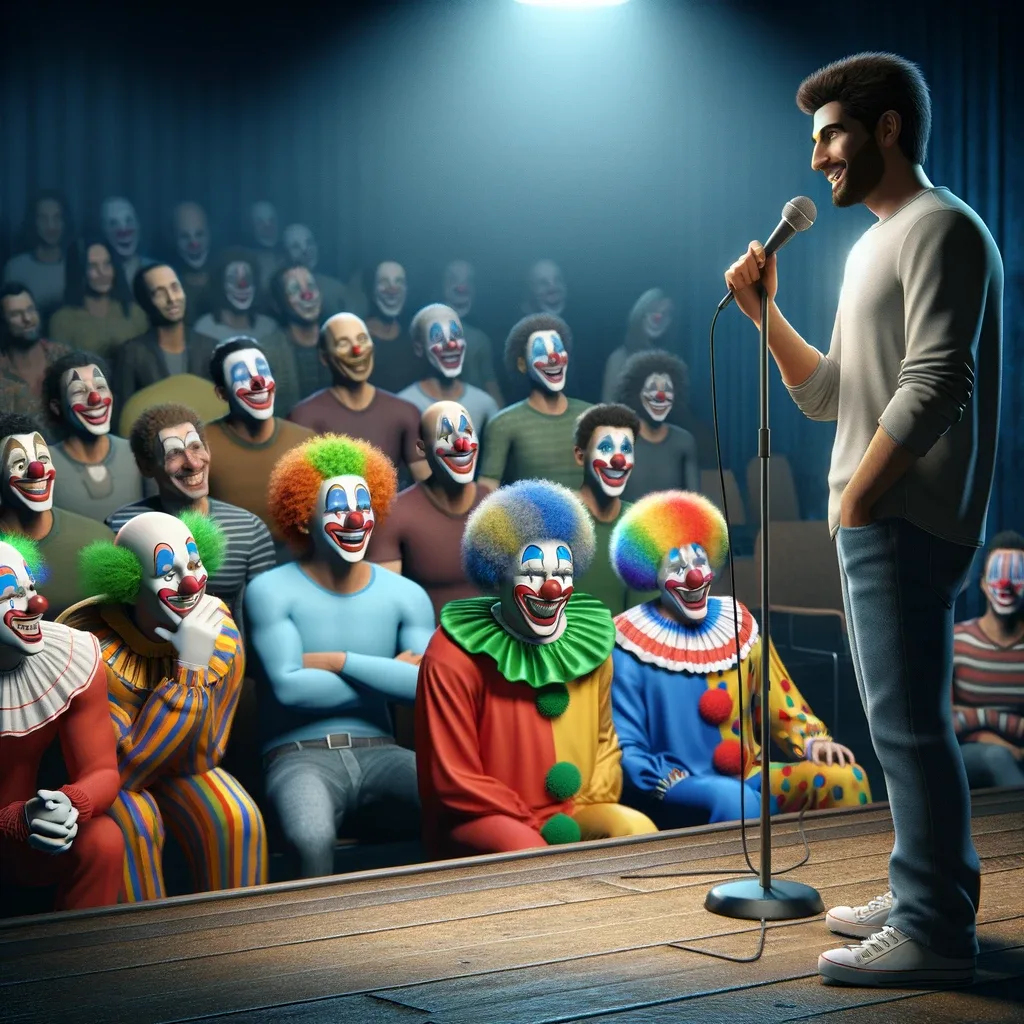
Clown 1 - Introduction to Clown - 6 Weeks (Mon Eves)
Theatre Deli, London
Learn More

by Charlie Jackson
So you’re a sexy new stand-up act, hitting the circuit and trying out your voodoo ways on audiences all over town? Great job! But there’s a few things that might be bothering you:
You find the same material can land really well but sometimes fall flat
Learning lines is stressing you out, what if you forget? Everyone will laugh at you but not in a good way?
You feel like a very static performer and want to inject more energy and life into your set
You want to be more playful whilst on stage
You want to connect more with the audience so that your same set can feel very personal to each different audience
Well, it sounds to me like learning a bit of clown comedy may help you there 🤡👍🙌

What is clown comedy I hear you ask? Simply put: Silly, physical comedy that fosters a deep connection to the audience (we have a longer write up here). It’s one of the oldest and most universal forms of comedy, and its teachings can help all manner of performing, from stand-up and improv to acting and giving presentations.
Clown training involves a lot of listening to the audience in order to react to what they’re enjoying and more importantly, change when they’re not enjoying it.
Let’s explore a bunch of ways that clowning can help your stand-up comedy.
One of the key flows in clowning is: do a thing, check if the audience like it, if they do, do it again or escalate it, if not, do something that worked before or something new, repeat.
Through repeated exercises and practice doing this, you start developing a better awareness of what the audience like and better impulses for what might work (which can be different for every audience). If you’ve trained in clown and you notice that a part of your stand-up set is getting more laughs than normal, you may stretch it out, play it up more, skip some of the bits coming up next and focus on what’s working here. Maybe even improvise a bit before continuing on with your set.
This is even more useful when things are going badly. If your entire set is about a topic the audience are just not onboard with, don’t commit to the next 4 minutes of plowing through that material. Instead you could drop the set, or bits of it, and just try something new, see how it goes, double down if it works or just play with your first act-out for the rest of the set.
These are relatively dramatic differences, but by improving your awareness of the audience, you’ll also be more aware of which bits work and which don’t. Allowing you to make better edits to your set going forwards, as you were paying closer attention to how it was landing.
Clown training helps hone your instincts for what’s funny, you spend a lot of time in The Flop (when things don’t work) and then trying anything to see if it’s funny. Over time you end up trusting your instincts more, having bigger and more interesting impulses which results in a performance where you can react more authentically and in a more fun way to anything that happens. Phone rings in the audience? Mime out an embarrassing call from their mum. Forget your lines? Borrow a book from the audience and read from that with fun commentary. Anything is better than freezing up and apologising. Clowning can help you feel like you have something to do in any situation.
In clowning you fail a lot, you fail so much that it doesn’t feel so scary to suck any more. You still don’t want to fail, you want to make people laugh until they keel over. Through clowning, when things don’t work it becomes a challenge you can solve right there and then, rather than something you could only solve by writing and preparing better (which doesn’t help you in that moment on stage). So the bad moments suck less, and you have some instincts to give you something to do.
Clowning is highly physical, expressive and often involves a lot of audience interaction. All of these skills can turn a flat, impersonal stand-up delivery into a dynamic, interesting and engaging performance that also helps you get closer to that 10,000 daily step count 🙌
This is especially important for any act-outs you have. Act-outs can be the most fun bits of a lot of sets, don’t rush them and make the most of them by improving your physical performing.
We show a lot of vulnerability in clowning, we’re showing the audience how we feel. If it’s working the clown will be happy, if not the clown will be sad. Showing the audience more of how we feel, shows them that we’re listening and we care how they feel. It develops a deeper connection that makes the audience more on your side. When you suck and you show us that you know that and don’t want to suck, we laugh, we’re on your side and we like you. If you shrug it off and continue with your “brilliantly written set” we think you’re an arrogant asshole 👎.
Feeling more comfortable to improvise and try out things in the moment can also lead to new material to be perfected later. If you’re always doing the same set regardless of how the audience are enjoying it, you’re learning much less. Writing your set doesn’t pause when you go on stage. Some of the best bits get discovered in the moment and then perfected through writing and repetition. Most clown training is improvisation and developing instincts that help here.
That’s enough for now. There’s more we haven’t touched on such as:
Improved rhythm of the set - Clowning helps you figure out when the energy needs to drop for a bit before rising again
Props and costume - Oh the world of props and costume has so much fun to offer!
Character development - Every clown is a character and every time you try something new with an audience your developing and learning more about what might work for that character
Keeping it simple - Most of the best comedic ideas a super simple. Complex ideas don’t often work in clowning so the training helps you focus on simpler and simpler ideas across the board.
But overall clowning can help take the pressure off, let you be more playful and spontaneous and really understand and respect your audience more. Leading to a more vibrant, engaging and personal show.
If you’d like to try some clown courses we run some at Playface. And we have a bunch of other schools and resources on our recommends page.
